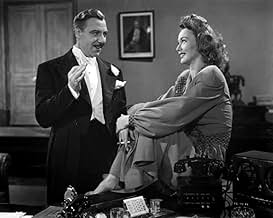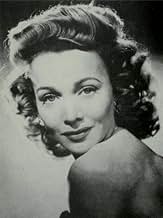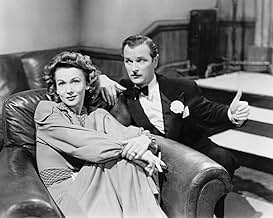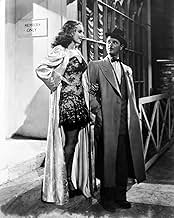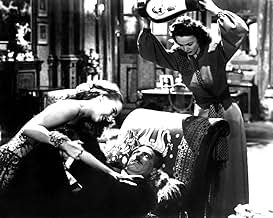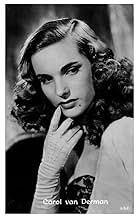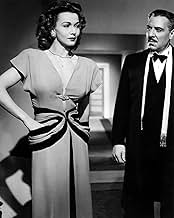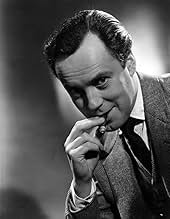Agrega una trama en tu idiomaIn post- WW2 Britain, an American fashion journalist, her ex-army fiancé, and a gang of honest toughs from a local gym attempt to bring black market organized crime to justice.In post- WW2 Britain, an American fashion journalist, her ex-army fiancé, and a gang of honest toughs from a local gym attempt to bring black market organized crime to justice.In post- WW2 Britain, an American fashion journalist, her ex-army fiancé, and a gang of honest toughs from a local gym attempt to bring black market organized crime to justice.
Carol van Derman
- Mercia Lane
- (as Carol Van Derman)
Argumento
¿Sabías que…?
- Trivia"Noose" was filmed in England during January and February of 1948. This was the final movie Carole Landis made before her death.
- ConexionesFeatured in Viaje por el cine francés (2016)
- Bandas sonorasWhen Love Has Passed You By
Composed by Edward Dryhurst
Lyrics by Barry Gray and Jean Cavall
Performed by Olive Lucius (uncredited)
Opinión destacada
Note: this is a review for the full-length UK version of this film entitled NOOSE.
It is always a pleasure to see a film noir that is not only entertaining, artistically satisfying and a little off-beat, but one that is little heard of. NOOSE, a British film from 1948, has many of the visual and plot elements of the American crime dramas made in the forties, and this one even features, unexpectedly, two American stars, Carole Landis and Joseph Calleia. Landis is a fashion reporter who, after getting a story from a girl who is later murdered, wants to get the goods on the man responsible for her death, a notorious and powerful black marketeer, even when she learns that it will entail personal danger to her. She is supported by her newly demobbed fiancé, who enlists a gang of toughs from the local gym to try to bring down the racketeer's empire. Quite a ride from here. --- The story was based on a play by Richard Llewellyn (noted for HOW GREEN WAS MY VALLEY), but it betrays little of its non-cinematic origins. Director Edmond Greville (a French-English director who began his career working with Abel Gance and ended it with the sleaze classic BEAT GIRL) lends the film considerable artistic flare -- the staging and camera angles will often surprise you; so much so that you sometimes believe you are watching an auteur film. Music is by the great Charles Williams (Dream of Olwen, Theme from the APARTMENT) and adds to the film. The cast is a standout, even though it occasionally seems to work to cross purposes. Carole Landis, who made her last two films in England, was not only an actress, but a singer, USO trouper, and baseball fan (her name came from Commissioner Kennesaw Mountain Landis!). Her career was lamentable spotty and her personal life a disaster, but she was a delight and it is a pity that shortly after this film she supposedly committed suicide (or, as some believe, was done in or something by her married boyfriend Rex Harrison.) Here she is vivacious and gives a performance well beyond that of the usual wise-cracking girl reporter. Derek Farr, always competent, seems bland by comparison and their pairing seems odd -- but the War did produce some odd couples. Joseph Calleia, originally Maltese, was a fixture in Hollywood during the forties and early fifties playing villains in gangster pictures and Westerns. As the kingpin black marketeer of foreign extraction he is simply superb, a performance Edward G. could not have bettered. Rivaling him for film time and stealing all his scenes, though, is Nigel Patrick as the flamboyant Cockney spiv who works for him. Stanley Holloway, known for comedic parts (LAVENDER HILL MOB, MY FAIR LADY) has an unusual dramatic turn as a policeman. --- This film is intriguing and eminently worth seeing, probably more than once, although, on the negative side, it is marred by an unevenness in tone, inconsistent pacing, and editing that disrupts the smooth telling of the story. -- also a few loose ends, such as what was the significance of Carole's character constantly taking her shoes off? Nevertheless, highly recommended for film noir fans!
It is always a pleasure to see a film noir that is not only entertaining, artistically satisfying and a little off-beat, but one that is little heard of. NOOSE, a British film from 1948, has many of the visual and plot elements of the American crime dramas made in the forties, and this one even features, unexpectedly, two American stars, Carole Landis and Joseph Calleia. Landis is a fashion reporter who, after getting a story from a girl who is later murdered, wants to get the goods on the man responsible for her death, a notorious and powerful black marketeer, even when she learns that it will entail personal danger to her. She is supported by her newly demobbed fiancé, who enlists a gang of toughs from the local gym to try to bring down the racketeer's empire. Quite a ride from here. --- The story was based on a play by Richard Llewellyn (noted for HOW GREEN WAS MY VALLEY), but it betrays little of its non-cinematic origins. Director Edmond Greville (a French-English director who began his career working with Abel Gance and ended it with the sleaze classic BEAT GIRL) lends the film considerable artistic flare -- the staging and camera angles will often surprise you; so much so that you sometimes believe you are watching an auteur film. Music is by the great Charles Williams (Dream of Olwen, Theme from the APARTMENT) and adds to the film. The cast is a standout, even though it occasionally seems to work to cross purposes. Carole Landis, who made her last two films in England, was not only an actress, but a singer, USO trouper, and baseball fan (her name came from Commissioner Kennesaw Mountain Landis!). Her career was lamentable spotty and her personal life a disaster, but she was a delight and it is a pity that shortly after this film she supposedly committed suicide (or, as some believe, was done in or something by her married boyfriend Rex Harrison.) Here she is vivacious and gives a performance well beyond that of the usual wise-cracking girl reporter. Derek Farr, always competent, seems bland by comparison and their pairing seems odd -- but the War did produce some odd couples. Joseph Calleia, originally Maltese, was a fixture in Hollywood during the forties and early fifties playing villains in gangster pictures and Westerns. As the kingpin black marketeer of foreign extraction he is simply superb, a performance Edward G. could not have bettered. Rivaling him for film time and stealing all his scenes, though, is Nigel Patrick as the flamboyant Cockney spiv who works for him. Stanley Holloway, known for comedic parts (LAVENDER HILL MOB, MY FAIR LADY) has an unusual dramatic turn as a policeman. --- This film is intriguing and eminently worth seeing, probably more than once, although, on the negative side, it is marred by an unevenness in tone, inconsistent pacing, and editing that disrupts the smooth telling of the story. -- also a few loose ends, such as what was the significance of Carole's character constantly taking her shoes off? Nevertheless, highly recommended for film noir fans!
- stephander
- 16 ene 2012
- Enlace permanente
Selecciones populares
Inicia sesión para calificar y agrega a la lista de videos para obtener recomendaciones personalizadas
Detalles
- Fecha de lanzamiento
- País de origen
- Idiomas
- También se conoce como
- The Silk Noose
- Locaciones de filmación
- Warner Brothers First National Studios, Teddington Studios, Teddington, Middlesex, Inglaterra, Reino Unido(studio: made at Warner Bros. First National Studios, Teddington, England.)
- Productoras
- Ver más créditos de la compañía en IMDbPro
- Tiempo de ejecución1 hora 16 minutos
- Color
- Relación de aspecto
- 1.37 : 1
Contribuir a esta página
Sugiere una edición o agrega el contenido que falta

Principales brechas de datos
By what name was Noose (1948) officially released in Canada in English?
Responda
